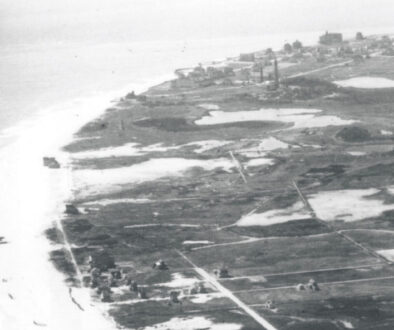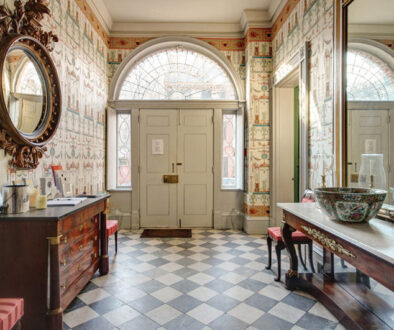Beach’s End

Even the Boss couldn’t save the Beach Theatre.
Ten years ago, in the midst of a campaign by an ad hoc group of Cape May citizens to rescue the historic Beach Theatre, Bruce Springsteen joined the chorus. The citizens group, assembled under the banner of the Beach Theatre Foundation, had scrabbled together enough money to convince the owner, Frank Investments, to let the group see if they could make a go of it. And as Steve Jackson remembers it, someone who knew someone with a connection to Springsteen went to New Jersey’s troubadour to ask for his help, resulting in the screening of Live in Barcelona, Springsteen’s much-praised, three-hour concert film for a $50-a-ticket New Year’s Eve party at the theatre.
“It was his idea to do this,” says Jackson, who led the effort in 2007. The Asbury Park icon had taken an interest in trying to preserve classic movie palaces in New Jersey and around the country, including places he’d performed in during the early years of his career. “We were the first ones to do it,” says Jackson. “He allowed us to keep all the proceeds.” At the time, Jackson recalls, the concert wasn’t available on DVD. “We had multiple showings, and people were coming from all over the Northeast to see it.”
But, as anyone who’s peeked around the back of what used to be the Beach Theatre today knows, it wasn’t enough. Where once stood an historic old structure, a relic of the post-World War II movie-making boom, opened in 1950 with posh amenities and a seating capacity of 860, there’s an empty lot. And therein lies a tale of a missed opportunity, a valiant but ultimately doomed effort to prevent one of the city’s gems from falling to the wrecking ball.
“The loss of any historic structure in the city is problematic, and once a structure is gone, it’s gone forever,” says Warren Coupland, who heads Cape May’s Historic Preservation Commission, charged with making sure that the city’s invaluable store of Victorian and other historic buildings is kept intact. “What drives people to go beyond Avalon, Stone Harbor and Wildwood are the wood-frame structures from the Victorian period in Cape May,” he says. And while the Beach Theatre, dating back only to the mid-twentieth century, fell into a kind of gray area outside the HPC’s direct oversight—indeed, that was a big reason why its demolition was allowed to go forward—its partisans today still feel the sting. Back in 2007, and until it was demolished in 2011, they’d dreamed about turning the Beach Theatre into a thriving entertainment center, showing everything from summer blockbusters to art films and including music, live theatre, community events, and more—even, perhaps, an art gallery and a restaurant.
That’s why it’s especially ironic to many of those who’d tried to save the Beach Theatre that last year the Harbor Square Theatre in Stone Harbor, complete with a vintage neon sign out front, opened to rave reviews. It’s a multiscreen venue with large, comfortable faux-leather rockers and, in the lobby, an attractively designed bar and restaurant, the Harbor Burger Bar, with beer, wine, and cocktails that can be taken by patrons to their seats. Making it doubly ironic, the Harbor Square Theatre used to be a Frank’s property, too.
Had things gone differently a decade ago, had the Beach Theatre Foundation been able to assemble the right investors, had Cape May’s city government intervened, had the citizens trying to save the theatre been able to continue a court battle, well, this story might have a different ending. And Cape May might have had another star in its constellation of live theater, restaurants, nightlife, and cultural showplaces.
On an unseasonably cool, early June day, a reporter strolled around the block once anchored by the Beach Theatre. Long gone is its trademark marquee facing Beach Avenue, and its whitewashed wooden façade is showing its age. The unsightly, shuttered ticket booth to the right of the old main entrance looks ghostly, and inside, the once glorious lobby is a wreck, piled high with paint cans, rusting old tools and other detritus. Its walls, once gaily painted and topped by fancy molding, evoke the feel of a haunted house.
Around back, where the theatre used to stand, in the very heart of Cape May’s historic Victorian district, is a gaping wound: a scraggly, gravel-strewn expanse, home to a bunch of unsightly dumpsters, garbage bins, and a half-empty parking lot. Fighting a chilly breeze, a few lonely looking laughing gulls scavenge the windswept space.
Back in 2011, Bernie Haas, the publisher of Cape May Magazine and one of the leaders of the now defunct Beach Theatre Foundation, stood outside the building as the heavy equipment moved in. “It took longer than they thought it would to knock it down, more than a couple of weeks,” he recalls. “It was sad.”
It wasn’t always so.
William C. Hunt was the motivating force behind the creation of Cape May’s Beach Theatre. A Camden theater mogul who got into the business pretty much at the dawn of the industry itself, back in 1905, with a chain of Nickelodeons, Hunt eventually came to own and operate nearly two dozen movie theaters, including seven in Cape May County. Alongside celebrated Philadelphia architect William Howard Lee—who was a protégé of Frank Furness, the architect who designed the Emlen Physick Estate—Hunt started work on the Beach Theatre in 1949. “Lee,” says Jackson, “was one of the most famous and respected architects of theaters in the Northeast.” In the space once occupied by the old Stockton Hotel, a half city block facing the ocean, Hunt and Lee created what they hoped would be a landmark edifice. No detail was spared: elegant wood paneling, specially designed carpeting, a state-of-the-art sound system, and a capacious lobby that mimicked the feel of the much larger New York movie palaces that had taken the Big Apple by storm in the 1920s. And, outside, the two men added the crowning touch, an assortment of beach-themed storefronts, a unique accompaniment that Hunt and Lee believed would add to the Beach Theatre’s attractiveness—and, of course, profitability.
“This was really the crown jewel of the Hunt organization in Cape May,” says Jackson. The total cost of the project: just $250,000.
It got noticed. According to a Philadelphia trade magazine, The Exhibitor, “Two eagles with wings spread dominate the patriotic motif of the gold medallion mounted on the green side walls of the auditorium. An intriguing plethora of pastel colors is found in the various stage curtains, while the drapes on either side of the proscenium are in golden fabric.” Two large painted murals—including one of the steamship Republic, portraying local politicians of a bygone era, along with elegantly-dressed women and men in top hats—adorned the walls. The lobby, according to the Exhibitor, was enhanced by crystal chandeliers and included a comfortable lounge and a candy counter with a “quilted, leatherette front and glass top.”
And outside, as old photographs show, a block-long array of planters filled with bright red geraniums welcomed moviegoers.
But by 2006, the Beach Theatre was a faded copy of the original 1950 edition. It hadn’t aged well, its seats were rickety, and the murals had been covered over. It badly needed a paint job.
Bruce Frank, the principal of Florida-based Frank Investments, says that as the business climate changed, as public movie habits shifted, and new technologies emerged to compete with movie houses, making a profit at the Beach Theatre became harder and harder. “We owned every seashore theater from Asbury Park to Cape May,” he says, ticking them off: Eatontown, Middlebury, Shrewsbury, Hazlet, Long Beach Island, Toms River, and more. Every single one is closed today, he says. “That’s the reality of seashore theaters. You can do business in the season, and you can do a little business out of season. But it’s the seashore.”
Over the years, says Frank, the original owners of the Beach Theatre carved up its space, dividing it into two auditoriums. In the mid-1980s, Frank Investments took it over, and they decided that in order to attract more patrons they had to add more screens. “We turned it into a four-plex,” he says. Even so, by the mid-2000s it had become clear to Frank that it was time to shutter the theatre, and in 2006 Frank Investments announced its intention to tear down the building and to replace it with beachfront condos.
“I thought, what a tragedy. I had been to this theater many, many times, as a kid, growing up, with girlfriends, and it had lots of memories,” says Jackson, then an advertising executive with a house on Columbia Avenue. “And I knew that when a town loses its local theater, it’s not a good thing. A theater can be the heart and soul of a community.”
Jackson took the initiative, with some friends, to create a nonprofit organization, eventually called the Beach Theatre Foundation, aimed at figuring out a way to keep it open. Exactly how that might work was up for discussion: either to buy it outright and to operate it as a community-run, nonprofit facility; to have the city run it; or to bring in a developer who’d upgrade and maintain it as a going concern. “We were certainly looking for developers, because they’d have the money, up to $15 million, down to $8 million, to buy the property.” At the time, says Jackson, Frank Investments was looking for at least $12 million for it.
In the meantime, the foundation convinced the city to provide a loan of $100,000 from a revolving state fund through New Jersey’s Department of Community Affairs, backed by an expanding group of about 40 Cape May residents. Using those funds, the foundation struck a deal with Frank to operate the theatre while trying to find a permanent solution. “We thought it was worthwhile,” says Jerry Gaffney, who’d just left office as mayor of Cape May and whose wife, then head of the Historic Preservation Commission, persuaded him to get involved. “At the time, we thought it would work. However, we got no help from the city whatsoever. The city council really had no interest in helping us.” Despite their best efforts, no developer could be found. “We couldn’t raise that kind of money,” recalls Gaffney. “Our intentions were good, but the effort was probably doomed from the beginning. Everybody reached out to everybody they could, but it was just too big a project.”
None of Cape May’s array of arts groups could help, either. Neither the Mid-Atlantic Center for the Arts, nor the Cape May Film Society, nor Cape May Stage and the East Lynne Theatre Company had anywhere near the wherewithal to step in.
“We ran programs there, we held our film festival there, we held an Oscar party at the Beach Theatre,” says Tom Sims of the Cape May Film Society. “It was a great community resource. We miss it. But there was no way we could afford to take it on.”
Gayle Stahlhuth, who supported the foundation’s efforts, is the artistic director for East Lynne Theatre Company, which stages live performances. She says that ELTC would have loved to been able to use the Beach Theatre as a venue and perhaps as a permanent home, especially if the reconfigured building included two small movie theaters and a room for live theater. But ELTC, too, didn’t have the resources to make it happen. “No big spender came forward,” she says.
In the end, while the issue of whether Frank could knock it down was bouncing back and forth between the Historic Preservation Commission and Cape May’s zoning board, the ability of the foundation and its supporters to continue was exhausted. “They had money and lawyers, and we couldn’t keep up the fight.” says Jackson.
“The Franks had some pretty sharp attorneys,” recalls Gaffney. “They said ‘we’re gonna sue the city unless the city overrides the boards,’ so the city caved in and issued the demolition permit.”
“It’s a tremendous lost opportunity,” says Jackson.
So what now?
Bruce Frank says that by the end of the year, he and a group of outside investors will announce plans to start work on what he calls a ‘spectacular project” on the old Beach Theatre property. “It’ll be a boutique hotel with a couple of restaurants, a banquet facility, a day spa, with a hundred units,” he says. “A modern state-of-the-art hotel.” The classic old Beach Theatre marquee and some of the murals that were inside might be included in the hotel, says Frank, though his exact words don’t inspire confidence: “I believe we may have maintained possession for our new project.”
If so, the shop owners that currently occupy what remains of the old Beach Theatre façade haven’t heard anything. Frank says that if and when construction starts, they’ll be temporarily relocated and brought back in. But Jane Wood, who runs Zoe’s Beachfront Eatery, shrugs. “They’ve been talking about that for years,” she says
For his part, Gaffney wrote a letter to the Cape May Star & Wave in February urging the city to use its power of eminent domain to seize the land, now an “eyesore,” and do something useful with it. Told that Frank says that there’ll be a sparkling new hotel there soon, Gaffney is blunt. “Don’t believe it.”







